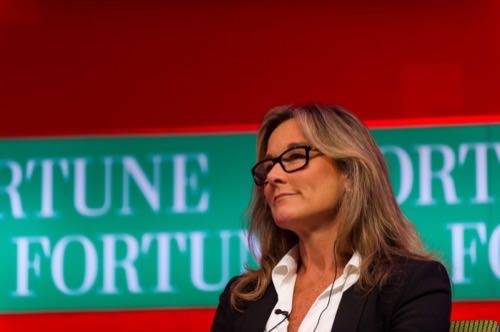
Apple, the giant consumer-electronics maker, has filled not one but two longstanding gaps in its executive ranks with the hire of Burberry CEO Angela Ahrendts, announced late Monday evening.
Ahrendts, who is well-regarded for turning around the luxury fashion brand, will run Apple’s 415 retail stores located in 13 countries across the world. She will also become the first woman to take a top management role at Apple in years; she joins a team of nine white men. She also brings international experience to a group of executives that have collectively spent much of their careers in northern California.
A Fashion For Technology
Diversifying Apple’s management ranks is critical for the company’s business. Increasingly, sufficiently advanced technology is indistinguishable from fashion.
The iPhone is already viewed by many consumers as a luxury brand, particularly in developing markets where its price point puts it out of reach of middle-class consumers. Taking the iPhone downmarket—or creating new devices that can reach new consumers—without tarnishing its brand is a critical challenge. Part of that challenge will be met technologically, but much of the finesse required in this move will come down to how it is sold in stores, particularly Apple’s own stores.
And as smartphones meld with the emerging category of wearables, how they look and function will become ever more critical. (Apple is widely expected to launch a smartwatch, and the new iPhone 5S has technologies, like a motion coprocessor, that might also find their way into such devices.)
A Square Deal?
Ahrendts will also run Apple’s online stores, as well as the retail stores, according to Apple’s announcement. (That doesn’t include the iTunes Store or App Store, according to an Apple spokesperson.)
Her hire could be good news for Square, the San Francisco-based company, which has collaborated with Burberry to take payments at two retail locations. But Apple might also move into payments itself.
People have widely expected Apple to make some kind of move into mobile payments, on the strength of the 400 million-plus Apple accounts linked to credit cards it has on file. Already, Apple customers can use an app to buy items inside a store, charge them to a stored credit card and walk out with their purchases.
Photo by Fortune Live Media

















